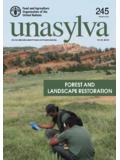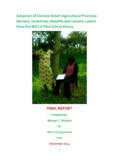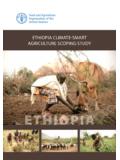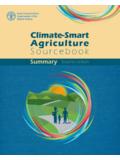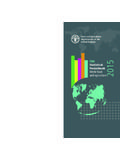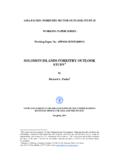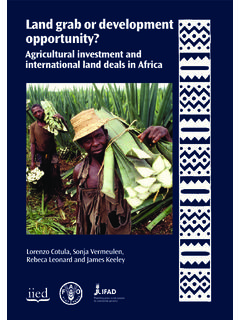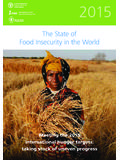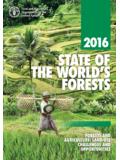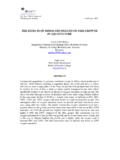Transcription of FOREST AND FARM PRODUCER ORGANIZATIONS – …
1 FOREST AND farm PRODUCER . ORGANIZATIONS OPERATING. SYSTEMS FOR THE SDGs STRENMGBTEHRS. IN NU. FOREST AND farm FACILITY. FOREST AND farm PRODUCER ORGANIZATIONS AND THE 17 SUSTAINABLE DEVELOPMENT GOALS. Joint access to Bring local resources voices to global for enhanced Membership-based processes entrepreneurship Productivity ORGANIZATIONS are and nutritious food: strong builders of farming to feed democracy everyone Sustainable Forests to sustain FOREST management biodiversity: fruit, for the health of nuts and medicinal the planet plants Fish gives 3 bn Vocational people 20% of daily training in animal protein rural areas Tree planting Women to gain restores degraded autonomy and financial landscapes rewards for their labour and entrepreneurship Maintain FOREST Reduce post-harvest cover on watersheds losses to food to reduce siltation and security maintain river flow Reduce urban Regulate the use migration of biomass energy Economies from forests Lobby for New agro- tenure rights.
2 Of scale for small forestry create benefit-sharing techniques allow businesses; jobs for mechanisms rural youth diversification and higher productivity FOREST AND farm PRODUCER . ORGANIZATIONS OPERATING. SYSTEMS FOR THE SDGs Strength in Numbers Published by the Food and Agriculture organization of the United Nations and AgriCord Rome, 2016. The designations employed and the presentation of material in this information product do not imply the expression of any opinion whatsoever on the part of the Food and Agriculture organization of the United Nations (FAO), or of AgriCord concerning the legal or development status of any country, territory, city or area or of its authorities, or concerning the delimitation of its frontiers or boundaries. The mention of specific companies or products of manufacturers, whether or not these have been patented, does not imply that these have been endorsed or recommended by FAO or AgriCord in preference to others of a similar nature that are not mentioned.
3 The views expressed in this information product are those of the author(s) and do not necessarily reflect the views or policies of FAO or AgriCord. ISBN 978-92-5-109287-3 (FAO). FAO encourages the use, reproduction and dissemination of material in this information product. Except where otherwise indicated, material may be copied, downloaded and printed for private study, research and teaching purposes, or for use in non-commercial products or services, provided that appropriate acknowledgement of FAO as the source and copyright holder is given and that FAO's endorsement of users' views, products or services is not implied in any way. All requests for translation and adaptation rights, and for resale and other commercial use rights should be made via or addressed to FAO information products are available on the FAO website ( ) and can be purchased through FAO and AgriCord, 2016.
4 Contents ACKNOWLEDGMENTS iv PREFACE v FOREST AND farm PRODUCER ORGANIZATIONS FEATURED IN THE REPORT vi EXECUTIVE SUMMARY viii INTRODUCTION 1. THEME 1 IMPROVING LIVES AND ECONOMIC WELLBEING 5. SDG 1: NO POVERTY 6. Small plantations increase household income UWAMIMA, Tanzania .. 6. farmers grow acacia trees for revenue TTHCA, QTCA and QNCA, Vietnam .. 7. farm forestry for diversified enterprises ZNFU, Zambia .. 8. Steady earnings from sustainable bitter bamboo production LFN, Laos .. 8. Higher household income MRDI, Zambia .. 9. SDG 2: ZERO HUNGER 10. Simple measures boost food production NFPG, the Gambia .. 10. SDG 3: GOOD HEALTH AND WELLBEING 11. Affordable healthcare for coop members Fedecovera, Guatemala .. 11. Distilling essential oil for medicinal use Thach Ngoa Star Anise Group, Vietnam .. 12. SDG 7: AFFORDABLE AND CLEAN ENERGY 12.
5 Regulating the charcoal sector for sustainability NACUL, Liberia .. 13. THEME 2 STRENGTHENING ENVIRONMENTAL STEWARDSHIP 15. SDG 13: CLIMATE ACTION 16. FOREST user group rewarded for restoring water table DBCF, Nepal .. 16. Communities adapt to climate change ACOFOP, Guatemala .. 17. Restoring forests to protect against climate-related erosion ASEC, Nepal .. 17. SDG 15: LIFE ON LAND 18. Organic agro-forestry to safeguard dry tropical FOREST MINGA, Bolivia .. 19. Eucalyptus trees can have environmental benefits Zenbaba Union, Ethiopia .. 19. Biosphere reserve protected by community action ACOFOP, Guatemala .. 20. Learning the environmental value of FOREST TTHCA, QTCA and QNCA, Vietnam .. 21. Woodlots scheme for active management SWA, Scotland .. 21. Agro-forestry for niche products protects hillsides TKFPI, the Philippines.
6 22. THEME 3 DEVELOPING SOCIAL COHESION 25. SDG 5: GENDER EQUALITY 25. Improving handicrafts for higher income Mayangna women, Nicaragua .. 26. Women take more control MVIWATA, Tanzania .. 26. Women process cashew nuts to add value URCPA-A/D, Benin .. 27. SDG 16: PEACE, JUSTICE AND STRONG INSTITUTIONS 28. Securing commercial community land rights KFUA, Myanmar .. 28. Supporting democracy and building peace FECOFUN, Nepal .. 29. Small FOREST -owners defend their rights LRF, Sweden .. 30. Lobbying for the right to cut trees AFFON, Nepal .. 30. THEME 4 FULFILLING HUMAN CAPABILITIES 31. SDG 4: QUALITY EDUCATION 31. Agro-forestry school to boost rural development Fedecovera, Guatemala .. 32. Study circles for smallholder cotton farmers CAZ, Zambia .. 32. SDG 8: DECENT WORK 32. Tree nurseries boost employment NCTA, Kenya.
7 33. New jobs as rice farmers diversify into honey Hanjuang Cooperative, Indonesia .. 33. SDG 10: REDUCED INEQUALITIES 34. Investing in their own sawmill Lem Village Acacia Group, Vietnam .. 34. Equality versus equity: how best to share benefits VNFU, Vietnam .. 35. THEME 5 PARTNERSHIPS FOR THE GOALS 37. SDG 17: REVITALIZE THE GLOBAL PARTNERSHIP FOR SUSTAINABLE DEVELOPMENT 37. Linking local voices to global processes Apex ORGANIZATIONS , global .. 38. Building networks of family forestry associations IFFA, global .. 38. Private forestry supported by national FOREST service FF-SPAK, Kenya .. 39. Beneficial government/civil society partnership CONOSIL, Mexico .. 40. MESSAGE FOR ACTION 41. ANNEX FFPOs INCLUDED IN THE REPORT, BY COUNTRY 44. ACRONYMS 46. Strength in Numbers | iii Acknowledgments This document is based on a range of sources of the experiences of FOREST and farm PRODUCER ORGANIZATIONS .
8 Thanks go out to all those who were involved in data collection, including the FFF country facilitators: Vu Le Y Voan (Vietnam), Racchya Shah (Nepal), Aung Thant Zin (Myanmar), Kanimang Camara (The Gambia), Kolly Soko Allison (Liberia), Vincent Ziba (Zambia), Philip Kisoyan (Kenya), Ogden Rodas (Guatemala), Boris Fernandez (Bolivia) and Leonardo Chavez (Nicaragua). Also to Katja Vuori for work on material from AgriCord. The publication has been overseen and coordinated by Paula Hokkanen (AgriCord), Erik Andervad and Sophie Grouwels (FAO/FFF). A wealth of useful feedback and ideas were provided by Pauline Buffle (IUCN/FFF) and Duncan Macqueen (IIED/FFF). Helpful comments during the drafting process were contributed by Jeffrey Campbell and Jhony Zapata (FAO/FFF), Peter deMarsh (IFFA), Ignace Coussement and Hannelore Beerlandt (AgriCord) and Anna Bolin (IIED), and Marguerite FranceLanord (FAO/FFF) advised on communications.
9 Thanks are due to the committed writer, Julie Harrod, for bringing the source material together. Finally, a special thanks to all the PRODUCER ORGANIZATIONS that are featured, who took time to respond to requests for data and whose answers make up large parts of the case studies. The production of this publication has been supported by official development aid from Finland, Sweden, Germany and the USA. iv | Strength in Numbers Preface By supporting smallholder foresters and farmers through their ORGANIZATIONS , the FOREST and farm Facility (FFF) continues a long-running collaboration between FAO and AgriCord. Now, together with the International Family Forestry Alliance (IFFA), we have made this compilation of cases that highlight how FOREST and farm PRODUCER ORGANIZATIONS (FFPOs) are vital operating systems for the Sustainable Development Goals (SDGs).
10 Our aim is to raise awareness of the ways in which effective FFPOs can bring rural populations into the global agenda for development. And we invite governments, development partners, civil society and the private sector to help channel further support to FFPOs in their critical role as effective local actors for sustainable global development. AgriCord is an alliance of development agencies set up by professional farm - ers' ORGANIZATIONS in Europe, Canada, Africa and Asia. Through its farmers Fighting Poverty programme, AgriCord supports organized farmers in devel- oping countries. Its work is based on two major convictions: that collective action of producers aligns growth with poverty reduction, because it ensures that producers have a fair share of the value of farm and FOREST (timber and non-timber); and that ORGANIZATIONS foster entrepreneurship, especially smallholder entrepreneurship, that contributes to vibrant rural communities.
